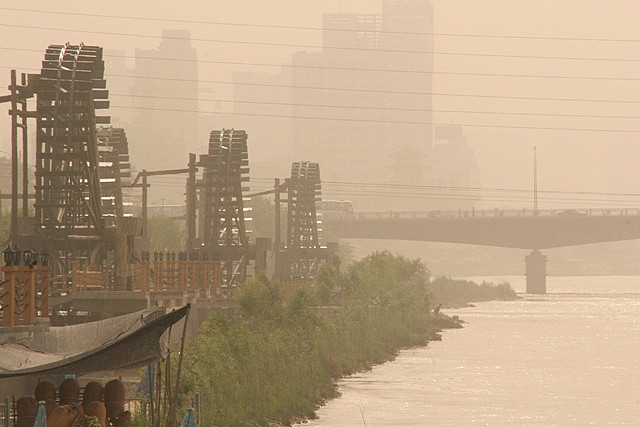Podcast: Play in new window | Download
Subscribe: RSS

Lanzhou, on the Yellow River in China, is one of the most polluted places in the world and is typical of the the consequences of unrestrained industry that are bringing Chinese protesters into the streets. (Photo by sandandtsunamis/Flickr)
China has long been the secret envy of American industrialists. Imagine being able to do whatever you want — build any factory anywhere, pay people whatever the hell you feel like laying them, dump your waste wherever the hell you feel like dumping it — all with no interference from any news media, EPA, environmental organization or opposition party. Forget West Virginia — that’s almost heaven. But be careful what you wish for, boys and girls; China is coming apart faster than we are.
Angry and violent protesters are taking to the streets in China — most recently in the Sichuan town of Shifang, the cities of Dalian in the northeast and Haimen in southern Guangdong province, and most recently in Qidong, on the east coast — not because of food prices, or low wages, or government repression. These are pollution protesters.
Near Qidong, a Japanese paper mill was about to build a pipeline to discharge its wastewater, 150,000 tons per day, directly into the ocean. When challenged about the plan, the government replied blandly that of course the factory’s sewage would not pollute the ocean. Under Mao, this sort of public relations used to work. But Mao did not have to deal with Facebook and Twitter spreading information and facilitating organization.
Last week, a thousand demonstrators took over the main government building in Qidong, trashed offices, overturned cars in the street and beat the crap out of two policemen. The frantic government first blocked the search term “Qidong” on China’s equivalent of Twitter, and when that failed to work, announced it would study the matter further, and when that didn’t work cancelled the project.
(So let me get this straight. The Chinese are able, in a few days, to stop a noxious pipeline from being built, but the American Keystone XL Pipeline project is still alive after how many years?)
A few weeks earlier in Shifang, in Sichuan province, the government deployed riot troops and tear gas to disperse angry crowds protesting plans to build a gigantic copper plant. They were under the impression that the emissions from the plant would poison them. Not their environment. Them. The government caved again, and cancelled the project.
To the Chinese people, it would seem, pollution is not an aesthetic concern for nose-wrinkling left-wing environmentalists. It is a threat to life. Vast tracts of land, much of the air and most of the waterways in the country have been to some extent poisoned by rampant, unrestrained industrialism. This industrialism has created a middle class where none existed before, people with the means to find out what’s going on around them and, once equipped with the Internet, to organize to do something about it.
In the United States, poisoning of the web of life has been somewhat restrained, in the past at least, by the aforementioned naysayers — environmentalists, journalists, liberals, and other such nabobs of negativism (does anybody remember Spiro Agnew?). But it proceeds apace, and is accelerating now as the big money (aided and abetted by the Supreme Court’s Citizens United decision) locks down more and more of our government. One of the consequences is that we are creating a whole class of unemployed and underemployed peasants where our middle class was before. And their lives are increasingly threatened by pollution and its many effects, including but not limited to climate change, oceanic dead zones, algae-clogged waterways and toxic air.
Their lot will be made far worse if China comes apart. Even the New York Times has published speculation about the possibility of not only unrest, but civil war in China. [See also this long piece in The Economist.] If that should happen, every Wal Mart store in the country will be deprived of 90 per cent of its inventory.
China has destroyed more of the web of life, faster, than we have, and its greatest fear now is destabilization by a middle class in fear of its life and armed with the Internet.
Note to American politicians: Our new peasant class has the Internet. And is becoming more afraid every day.
Let’s just keep in mind that premodern China lasted a few thousand years without any major intermission, and during this whole stretch of time inflicted little damage on the biosphere; it was the West that compelled her from the 19th century onwards to take the path leading to what we find today.
Thought I’d provide a couple quotes from Confucius for the occasion, by the way:
“The superior man understands what is moral, the mean-minded man what is profitable.” (Confucius, Analects 4:16)
“Acts motivated by profit are all too often a source of enmity.” (Confucius, Analects 4:12)
No argument here that the West led the way down into the Inferno. But if the Chinese understood Confucius as you quote him here, would they not have chosen not to follow?
They initially very much preferred not to. But when you’re an agrarian society facing foreign aggressors armed with advanced technology, how much of a choice do you really have?